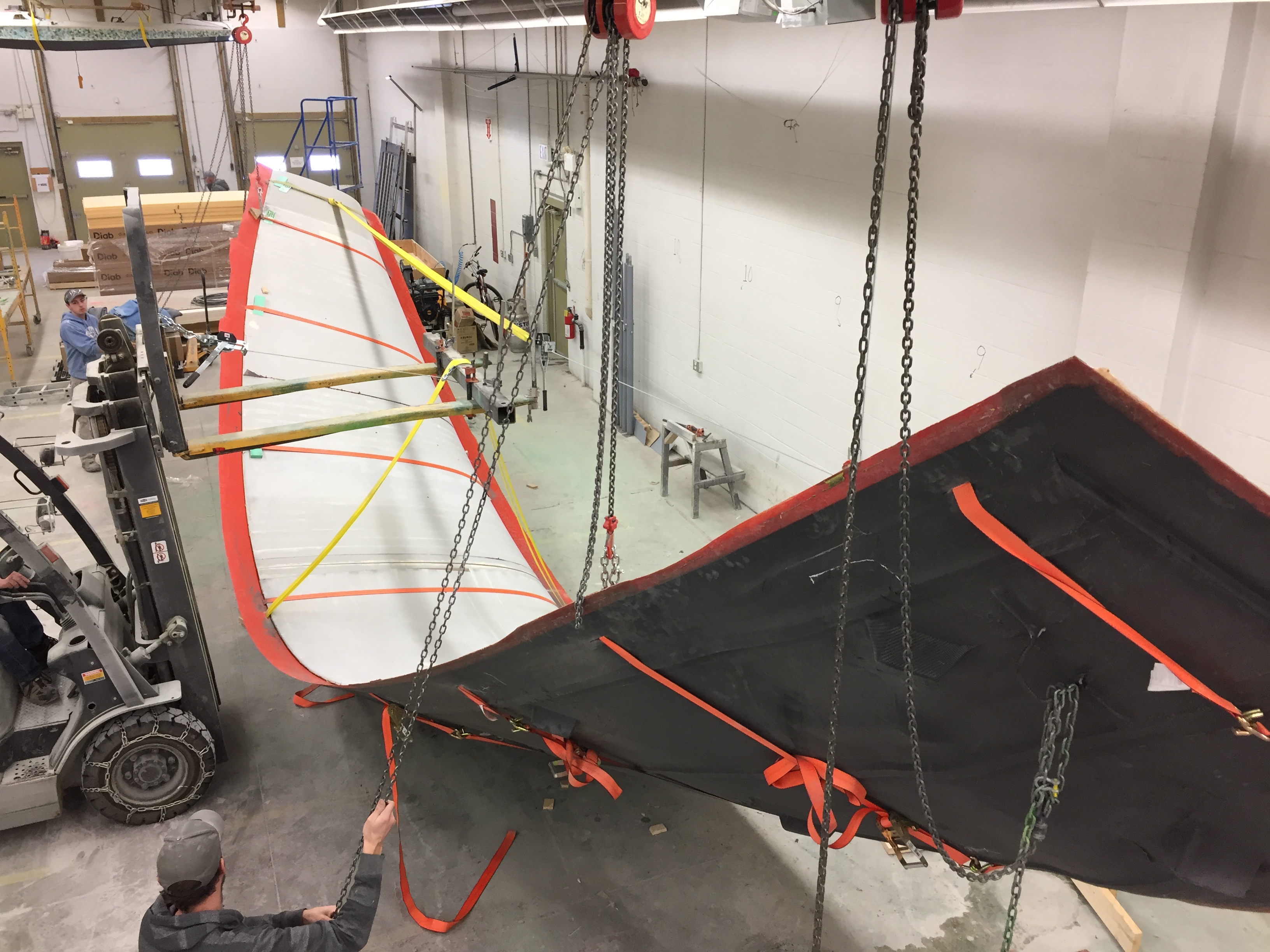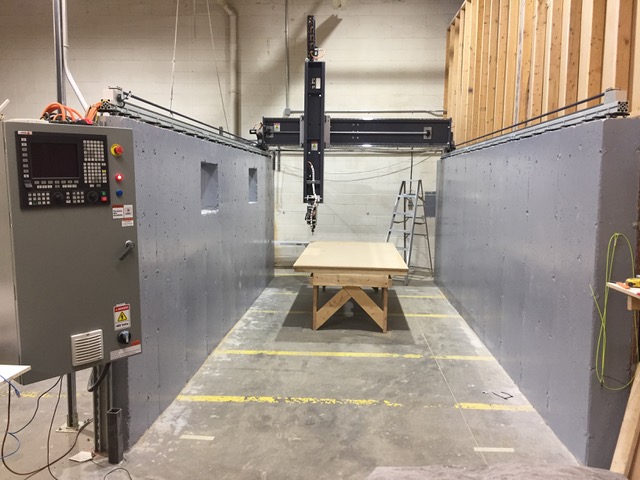Coastal Enterprises, manufacturers of Precision Board HDU, is proud to host guest blogs written by some of the industry’s biggest movers and shakers, posted to the Precision Board Blog. This guest blog is written by Philip Locker, President of Competition Composites Inc in Ontario, Canada and Ryan Church, CEO of BiomeRenewables Inc. Philip tells us how he used Precision Board high-density urethane tooling board to make a plug (or master pattern) for a unique wind blade design from Biome Renewables measuring 40′ from tip to tip. Locker used PBLT-15 because it weighs less than other tooling substrates and is cost-effective, especially on large projects like this one. He lets us in on how his team completed the project using two 3-axis CNCs, each with a 4’x8′ table. Church describes how this innovation and unique methodology is at the core of what Biome does.
As Philip explains, here at CCI we were challenged with the construction of the tooling for a unique highly-bent and twisted wind blade that is about 40’ from tip to tip when measured along its surface. We’ll be making three of these blades, which together form Biome’s PowerCone® technology.
Adding to the puzzle, we had two 3-Axis CNC milling machines to work with, each with a 4×8 table and limited to 9” of Z travel.
We like to use PBLT-15 Precision Board urethane for plugs and single-use tools as it takes good detail when milling, is pinhole-free when primed, and is a good combination of light weight and strength – both key criteria as this large wind blade plug would need to be flipped in one piece when one half-tool was completed and we were moving on to the other side.
Church added that innovative use of materials such as this is required to achieve the sort of product performance that they are looking for. Through a collaborative process, it was identified that PBLT-15 could do an excellent job.
The tooling that we specified allows us to get multiple “pulls” from it. Here, a higher density board is used – PBLT-20 or more – as strength goes up with density, and it would be a disaster if a foam tool broke during demoulding before the whole production run is complete.
As Phil explains, we chose to do the plug in 4” thick slices of foam, the thickest we can reasonably mill given our CNC setup. This is typically done in wind blade fabrication. The plug was made up from about 120 slices, each assembled around tubing to keep the relative alignment between sections. It all went onto a CNC-milled MDF assembly frame as 5 subsections that were bonded together once we were satisfied with final fit. We shot a first coat of Duratec primer over the whole blade, then addressed the joints and blemishes that this made evident, before priming again and then release-coating. We then polished and laminated the carbon fiber tooling from the plug.
The biggest challenge of the project was the “flip”, given the relatively small space inside the shop. We used a great many tie down straps around the plug and completed half-tool to keep it all together while rotating via chain blocks on overhead I-Beam trolleys. We pulled it off and went on to complete the second side of the tool.

This project has been an incentive to invest in a 5-Axis CNC milling machine to give us greater capacity for projects such as this. Being a custom-built machine that is intended only for tooling board, MDF, and similar density materials we were able to source it at a favourable price point compared to ready built equipment, and with its large milling envelope of 5m x 2m x 1.5m (16’ x 6.5’ x 5’) it will lend itself to a large variety of tasks. We can’t keep it busy with our in-house work, and welcome inquiries for milling-only jobs. CCI is located just outside of Canada’s capital city of Ottawa, Ontario.
As Church explains, Biome Renewables is re-defining expectations in wind power with their PowerCone technology, a turbine retrofit that channels air onto the turbine blade, increasing production while limiting loads. The results is not just more power, but power from a place where no larger blade or smarter software can find it. The collaboration with CCI will lead to the first ever full-scale demonstration of the technology, in partnership with Capstone Infrastructure.
The PowerCone technology allows for increased annual energy production (AEP), while limiting loads and decreasing noise production. It’s a first for the wind industry, and is being pioneered in Canada.
To see more about the PowerCone, visit www.biome-renewables.com.
CCI offers the highest quality of products and services on the custom composites market today. Since 2002, we have provided superior service to our customers and have assisted them in achieving their goals in composites use and design. Whether it is winning races, keeping instruments in the air or product development, our depth of experience and commitment to excellence will allow you to focus on what you can do best – deliver to expectations. We have earned the reputation as one of the best composites full service providers globally, able to work on any custom job you may have. We invest regularly in the equipment to remain competitive, including our new 5-Axis CNC machine. And though we ship world wide, we are equally pleased to service our local customers in person. You can call Competition Composites Inc at (613) 599-6951 or visit their website.
Coastal Enterprises manufactures Precision Board, a versatile, cost-effective and eco-friendly urethane material used extensively in the tooling industry. It is a closed-cell, rigid, dimensionally-stable substrate that is ideal for use in a number of different tooling applications.
Request free samples, get a quote or sign up for weekly e-blasts packed with helpful information.


